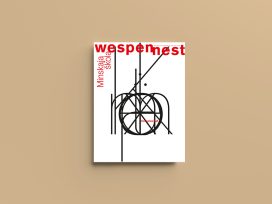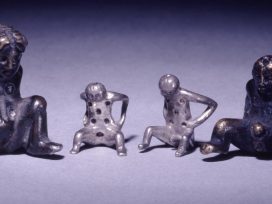Laurie Taylor: We called our event “A Reasonable Life”. This could be interpreted as a rational life. But it also suggests a life that was satisfactory. Not a driven life with a clear purpose but one which worked out, which was, well, reasonable.
Jonathan Miller: At one time, between about 18 and 25, I think I had a compass directing me towards doing medicine. Not in order to be helpful. I was driven by medical and biological curiosity. I didn’t want to harm anyone, but I wasn’t particularly interested in being involved in treatment and cure. I accidentally fell out of what I intended to do, which was to become a doctor and a researcher in neurology, because I did Beyond the Fringe, and one thing led to another, and my entire moral fibre rotted, you see, and I just went on directing plays.
LT: You have a nice phrase to characterize the role of chance in your life. You say it’s almost as though you’re happily sitting at home and then someone comes and knocks on your door and says, “Come out to play.”
JM: Well, that is really the way it’s always been. I got into the theatre as a result of a series of unsolicited invitations to come and do things. George Devine at the Royal Court asked me to come and direct a play and I had to explain to him that I’d never directed a play in my life and had no intention of doing so. And he said, “you’ll probably pick it up as you go along.” And I found to my delight and slight bewilderment that actually it was something which I found I could do as a result of the skills I had learnt as a trainee clinician. And then I got a whole series of unsolicited invitations. I got asked to do some operas, and I said I don’t know anything about opera, I’ve only been to one in my life, and I said I can’t read music, and the conductor assured me that he could. I found again that I was dismayed by the fact that it was easy. Not because I’m so clever, but because people underestimate what I think is the real function of directing which is, as my mother said, to make the negligible considerable. That’s exactly what happened in my clinical training at UCH. I was trained to look at negligible details from which you could infer what was wrong with people.
LT: Is it possible to say which of the activities has given you the most pleasure?
JM: I’ve been involved in drama, either plays, opera or television, and of course documentaries, and on the whole the things which I enjoy doing are staging fictional versions of human action, human behaviour. I try to make operas as much like that as possible. It’s not always possible, because most operas, in terms of behaviour, are totally ludicrous. If you look at 90 per cent of the operas which were written in the 19th century, you’ll find wonderful music to listen to as long as you don’t have to look at what goes on.
LT: Do you include Beyond the Fringe in that inventory? People say to me, “Oh, if you’re talking to Jonathan, ask him to talk about Beyond the Fringe“, and I sometimes think that you must be a bit bored with such reminiscences, although in your writing and talking you do go back to it quite a bit yourself, as though it still remains a source of humour, it still counts.
JM: People misinterpret what Beyond the Fringe was. They say it was this wonderful, revolutionary moment in humour, and it actually wasn’t. It was part of a very large movement that was going on as a result of the readjustment of sensibility which occurred at the end of the Second World War. It was coincident with things like John Osborne’s plays, and new types of painting. There was a social structure which began to reorganize itself as the result of the experience which we in England had as a result of enduring the risks and dangers of the war, and also of sharing, above all, the shortages of food and rationing. Beyond the Fringe was the result of this, one amongst a very large number of transformations which took place in the sensibility of people in England.
LT: Does humour stay the same, Jonathan? Do the people who made you laugh when you were young still make you laugh?
JM: Yes, my wife and I listen to the Goon Show, on Radio 4 Extra, and there it is, 50 years afterwards, and it is still hysterically funny. Again it draws my attention to the question of the structure of this peculiar form of discourse which produces this pleasurable experience of being funny. If there wasn’t pleasure in sex, you would otherwise have to make an appointment in your diary to engage in it. It’s very important from the point of view of your natural selection to go on multiplying and reproducing your kind. So you have to have something that makes it pleasurable. The same thing with food. And you have to ask yourself a deeper, more generalized question about why is pleasure associated with a certain experience? I can only use the Darwinian argument – I think that pleasure is an incentive to engage in something which would otherwise be laborious.
LT: Another version of “A Reasonable Life” would be “a life of reason”, a life in which you have placed a taboo on all superstitions, on all irrationality. In your splendid television series A Rough History of Disbelief, you pay tribute to some heroic figures, people from the early days of the Rationalist Association who were liable to be taken to court, or be ostracized for their lack of belief. You suggest we don’t need figures like that at this time. But don’t you have any sense that there is a growing irrationalism, that it is still a threat to public life?
JM: Yes, but they’re not tyrannies in the same way. It is to some extent in the United States where you do have a powerful religious centre around that Tea Party and elsewhere, which actually might be a tyranny because they will for example forbid the teaching of evolution. I remember once giving a lecture in an American university, somewhere up in Iowa, and I was talking about the history of biology, and when I asked if there were any questions a chap in the front got up and said, “Dr Miller, are you an evolutionist?” And I said, “Well, only in the sense that I’m a gravitationist.” And he said, “No, seriously, are you an atheist?” And I said, when I say I’m not an atheist, it’s not that I’m an agnostic and I’m hedging my bets. It’s just that I cannot think it is worth having a word to describe it. It’s so trivial, my not believing in God in the present day. I don’t believe in witches, but I don’t call myself an ahexist.
LT: Sociologists 20 or 30 years ago were all talking about religion withering away. But it seems to have been revived in forms that are far more fundamentalist than we would have expected.
JM: But we have to remember that in the case of the Islamic fundamentalism it’s associated with an objection to what they see as the military tyranny inflicted upon their people by the United States and by NATO. It’s a politically motivated thing.
LT: In A Rough History of Disbelief, you gave some space to the ideas of spirituality and the transcendent. One or two of the people you interviewed were insisting that there was a need to have some sense of what is wonderful about the world.
JM: Well, one is amazed by the fact that anything exists at all. But that doesn’t lead one to what religious people think, which is that because something exists there has to be some agency which brought it into existence. The idea of agency is confined to us, confined to animate creatures which are conscious of our agency. What is the difference, you might ask, between events and actions? There is a tremendous difference between things we regard as events, for which we seek causes, and things which are actions, for which we seek motives. I think one of the things which lead to religion is this strange anthropocentric idea that if something is there it has to be a result of a motive rather than a cause.
LT: You make this nice point about children: young children think that if the clouds are moving, someone must be moving the clouds, there is some intention behind clouds. You make the point that we all learn this to be mistaken as we grow up. If we are at the seaside we know that if we move toward the sea that’s intentional, whereas if the sea moves towards us that is without intention.
JM: Right back in Greek antiquity you get people like Democritus who don’t seek anything like agency, they simply see that these are the products of causes. And in fact it lights up again during the Enlightenment when people are trying to re-establish the difference between things which are the outcome of causes, and things which are the outcome of intentions. In the history of embryology we only began to understand what embryology was when we got rid of the idea of there being some sort of teleology, in other words a final end for which the actions are enacted to bring about an expected, intended outcome or result. But that is in fact because we have surrounded ourselves with our own artefacts, things which are the product of our intended making. We make the thing in order to hold water, and we pour it in order to fill the glass, and raise it in order to drink. These are actions for which we seek agency.
Now one of the things of course which is peculiar about human beings is they are idiotically anthropocentric, they think that everything around must itself be the product of an agent’s intention to bring it into existence. That in the same way there are milk bottles which were intended to be milk bottles, if there is a universe then there must be some creature, some creator, that had agency and therefore intention to bring it into existence. And I think we’ve now shrunk the domain of agency into the area which is confined to animate creatures, and particularly to human, consciously intentional creatures, and realized that the rest of it is not the product of intention: it’s the product of something for which science has a different type of account, what we call a causal explanation.
LT: We’re touching the area of Intelligent Design, the idea that because there’s this beautiful flower, this magnificent sunset, this wonderful sunrise, all these moments that we can find so stirring, then surely something which affects us so much, which strikes us as so uplifting, so transcendental, must surely have some meaning. It points to the existence of some designer.
JM: Well, no, it quite clearly doesn’t. That’s because we’re anthropocentric. To think of such things, such matters, as being the product of a disembodied intelligence is not, as Hobbes says in the Leviathan, simply wrong. It’s also meaningless, as meaningless as the idea of a circular rectangle.
LT: Let me press you on your own transcendental moments. Your oceanic feelings, as Freud called them, the moments when suddenly something affects you dramatically. You might be going into a cathedral, you might see a stained-glass window, you might hear sacred music.
JM: Why is it that you always have to invoke these authorized versions of the transcendental? I find that it’s just as remarkable to actually see two cells, or a single fertilized cell, unexpectedly dividing. One of the great things that happened to me as a student was, I used to go to this place up on the Clyde estuary with these other medical students, including Oliver Sacks, to the Scottish Marine Biological Station. We used to collect sea urchins, take the eggs and the sperm, put them into a thing, shake them around so that the sperm and the eggs were mixed up, and we sat and watched these very unglamorous, untranscendental things, a glob, with a barely visible nucleus, which, quite suddenly, divided into two. And then you waited for another 15 minutes, and each of the two divided once again, into four. And as we went through the night we watched the thing coming to an outcome, the outcome being the larva of another sea urchin. Without any instructions – it wasn’t as if this globule said, “What in fuck’s name am I going to be? Shall I become a squirrel or shall I become a sea urchin? Well, I don’t know as yet, I will consult Him up there.” It happens, and the happening is just as transcendentally attractive to me as a sunset or a sunrise. But there are all sorts of things which deeply move one, without having to feel that one is in the presence of something transcendental and superior which brings it about.
LT: You once said rather nicely, “If you don’t get the transcendent from the negligible, you don’t respect the world enough.”
JM: I got that from my mother, who was a novelist. When she was writing, I’d say ,”What are you doing?”, and when I was old enough to understand she said, “Well, what I’m trying to do is make the negligible considerable.”
LT: And that is something that you have applied throughout your life, to your dramas, to your writings. So when you talk about Flaubert’s genius in Madame Bovary, it is to make the reader interested in a woman, Madame Bovary, who is not on the face of it at all interesting.
JM: No, she’s a boring slut. But actually here is this extraordinary person whom you find yourself sobbing at her suicide. But you see, there the transcendental is associated not with grandeur but with squalor and the squalid, seedy death that she undertakes. That is the transcendental experience in the sense that death itself, and to witness death, either described or actual, is in fact just as moving, if not more moving than witnessing a sunrise.
LT: You’re not an optimist? Would you ever describe yourself as an optimist?
JM: I’m neither an optimist nor a pessimist. I just think that we’re in the middle of this rather peculiar, unbelievably complicated experience.
Jonathan Miller and Laurie Taylor were speaking at the Rationalist Association event on 19 October 2012 at the Bishopsgate Institute, London. You can listen to the full discussion via the RA podcast page.






